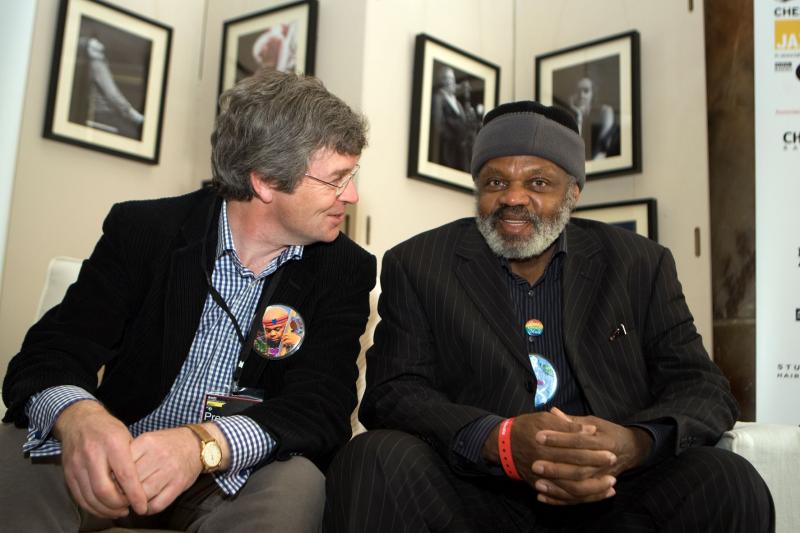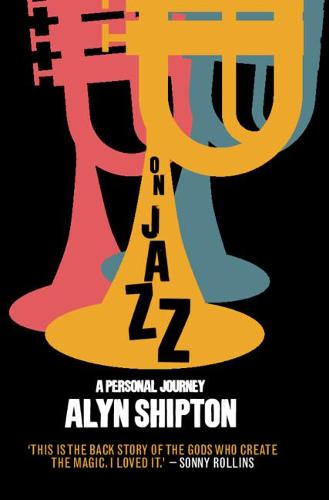Alyn Shipton: On Jazz - A Personal Journey - digging jazz deeply and musically | reviews, news & interviews
Alyn Shipton: On Jazz - A Personal Journey - digging jazz deeply and musically
Alyn Shipton: On Jazz - A Personal Journey - digging jazz deeply and musically
Alyn Shipton is a meticulous historian

“I suppose you’re going to ask all the usual questions...?” When Keith Jarrett was interviewed by Alyn Shipton for the very first time, the pianist, who could often be tetchy in such situations, clearly had low expectations. Deftly, Shipton asked him what it had been like to play the baroque organ in the abbey at Ottobeuren for the recording of Hymns/Spheres for ECM in 1976.
This anecdote – which is not in the book On Jazz - A Personal Journey itself, but in an interview the author has done to promote it – is revealing. Shipton has had a prolific involvement in jazz as broadcaster, author, publisher, critic and jazz historian, but that is not the whole story. Whereas Shipton has “either published or co-edited” no fewer than 24 biographies of musicians, has been broadcasting for the BBC more or less continuously since 1989, and has based the book itself on around 100 of the vast number of interviews he has done, the list of his occupations/professions includes one more, and it is a significant one: “working musician”. Active involvement in and musical literacy always shape the way he approaches the vast subject of jazz.
On Jazz, says the preface, “draws together oral history, personal experience and jazz criticism in an attempt to discover more about the circumstances and settings in which jazz was and has continued to be created.” Shipton is always assiduous in seeking out and counter-checking stories in order to improve their reliability. There are good examples of this in action in the chapter on Oscar Peterson, where he interviewed not only the leader, but also bassist Ray Brown and drummer Ed Thigpen, and is able to tell their interlocking stories. A similar case is that of the quotes from rhythm section players from the Basie and Ellington bands.
One early mentor who set standards for such thoroughness in his day, and whose guidance and influence Shipton gladly acknowledges, is the trumpeter and writer John Chilton. Shipton is similarly driven to seek out and tell reliable and interesting stories about the music. And there are good yarns and perspectives a-plenty. The chapter “The Dawn of Fusion” has historical insights into the jazz-rock movement of the early '70s, with the sequence of interviewees including John McLaughlin, Jack Bruce, Ian Carr and Billy Cobham. When it comes to understanding why Ornette Coleman was such an important innovator, Coleman’s own thoughts are followed, deepened and balanced by those of Dewey Redman, Charlie Haden and George Russell.
 This meticulousness is a Shipton hallmark. For example, he continues to keep a permanently up-to-date log of his activity with a discography of the music played on every episode of BBC Radio 3’s weekend show Jazz Record Requests in the “blog” section of his website. The fact that Shipton always carefully kept and filed his interviews, either in the form of typed transcriptions (in the early days) or audio files (later), has allowed this book to be written and now to be published.
This meticulousness is a Shipton hallmark. For example, he continues to keep a permanently up-to-date log of his activity with a discography of the music played on every episode of BBC Radio 3’s weekend show Jazz Record Requests in the “blog” section of his website. The fact that Shipton always carefully kept and filed his interviews, either in the form of typed transcriptions (in the early days) or audio files (later), has allowed this book to be written and now to be published.
He deals with tricky issues in a similarly ordered fashion. So, when the “complex questions” raised when “a white European writer” aims to represent “the Black experience in America”, Shipton addresses it candidly and head-on in the Preface.
This book does dig deep into the detail of jazz, which will fascinate some, and may put off others. The level of care to which Shipton goes in order to ensure that his narratives are correct and reliable sometimes feels like a dying art. Among jazz writers, there are others who care deeply in a similar way that their stories are right: the South African specialist Gwen Ansell, the pianist Ethan Iverson and the Detroit writer Mark Stryker, for example, immediately come to mind as people who uphold such standards. If only such care for the facts and the truth was more prevalent in our society.
The future of Arts Journalism
You can stop theartsdesk.com closing!
We urgently need financing to survive. Our fundraising drive has thus far raised £49,000 but we need to reach £100,000 or we will be forced to close. Please contribute here: https://gofund.me/c3f6033d
And if you can forward this information to anyone who might assist, we’d be grateful.

Subscribe to theartsdesk.com
Thank you for continuing to read our work on theartsdesk.com. For unlimited access to every article in its entirety, including our archive of more than 15,000 pieces, we're asking for £5 per month or £40 per year. We feel it's a very good deal, and hope you do too.
To take a subscription now simply click here.
And if you're looking for that extra gift for a friend or family member, why not treat them to a theartsdesk.com gift subscription?
more Books
 'We are bowled over!' Thank you for your messages of love and support
Much-appreciated words of commendation from readers and the cultural community
'We are bowled over!' Thank you for your messages of love and support
Much-appreciated words of commendation from readers and the cultural community
 Frances Wilson: Electric Spark - The Enigma of Muriel Spark review - the matter of fact
Frances Wilson employs her full artistic power to keep pace with Spark’s fantastic and fugitive life
Frances Wilson: Electric Spark - The Enigma of Muriel Spark review - the matter of fact
Frances Wilson employs her full artistic power to keep pace with Spark’s fantastic and fugitive life
 Elizabeth Alker: Everything We Do is Music review - Prokofiev goes pop
A compelling journey into a surprising musical kinship
Elizabeth Alker: Everything We Do is Music review - Prokofiev goes pop
A compelling journey into a surprising musical kinship
 Natalia Ginzburg: The City and the House review - a dying art
Dick Davis renders this analogue love-letter in polyphonic English
Natalia Ginzburg: The City and the House review - a dying art
Dick Davis renders this analogue love-letter in polyphonic English
 Tom Raworth: Cancer review - truthfulness
A 'lost' book reconfirms Raworth’s legacy as one of the great lyric poets
Tom Raworth: Cancer review - truthfulness
A 'lost' book reconfirms Raworth’s legacy as one of the great lyric poets
 Ian Leslie: John and Paul - A Love Story in Songs review - help!
Ian Leslie loses himself in amateur psychology, and fatally misreads The Beatles
Ian Leslie: John and Paul - A Love Story in Songs review - help!
Ian Leslie loses himself in amateur psychology, and fatally misreads The Beatles
 Samuel Arbesman: The Magic of Code review - the spark ages
A wide-eyed take on our digital world can’t quite dispel the dangers
Samuel Arbesman: The Magic of Code review - the spark ages
A wide-eyed take on our digital world can’t quite dispel the dangers
 Zsuzsanna Gahse: Mountainish review - seeking refuge
Notes on danger and dialogue in the shadow of the Swiss Alps
Zsuzsanna Gahse: Mountainish review - seeking refuge
Notes on danger and dialogue in the shadow of the Swiss Alps
 Patrick McGilligan: Woody Allen - A Travesty of a Mockery of a Sham review - New York stories
Fair-minded Woody Allen biography covers all bases
Patrick McGilligan: Woody Allen - A Travesty of a Mockery of a Sham review - New York stories
Fair-minded Woody Allen biography covers all bases
 Howard Amos: Russia Starts Here review - East meets West, via the Pskov region
A journalist looks beyond borders in this searching account of the Russian mind
Howard Amos: Russia Starts Here review - East meets West, via the Pskov region
A journalist looks beyond borders in this searching account of the Russian mind
 Henry Gee: The Decline and Fall of the Human Empire - Why Our Species is on the Edge of Extinction review - survival instincts
A science writer looks to the stars for a way to dodge our impending doom
Henry Gee: The Decline and Fall of the Human Empire - Why Our Species is on the Edge of Extinction review - survival instincts
A science writer looks to the stars for a way to dodge our impending doom
 Jonathan Buckley: One Boat review - a shore thing
Buckley’s 13th novel is a powerful reflection on intimacy and grief
Jonathan Buckley: One Boat review - a shore thing
Buckley’s 13th novel is a powerful reflection on intimacy and grief

Add comment